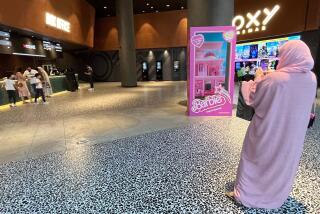Satellite TV Gives Libya a Window on the World
- Share via
TRIPOLI — When their satellite receivers broke down, some well-to-do Libyans sailed to Malta to repair them--so strong was their addiction to foreign TV programs.
“Libyan television is so boring,” said Mohammed al-Basir, 15, whose daily routine is to plant himself in front of the television after school to watch satellite programs.
To many Libyans, foreign films and songs are their windows on the outside world in an otherwise culturally and politically enclosed country.
Libya’s young have little to do. School is often canceled because the government has not paid teachers for months. Men and women do not mix freely in Libya’s traditional society.
“The young feel very empty,” said Alaa Bazzama, 21, a sophomore at Tripoli’s Al-Fateh University, as he played in a billiard hall one morning.
State media broadcast little more than patriotic songs and Col. Moammar Kadafi’s speeches. The liveliest programs are children’s cartoons, Arab soap operas and movies late at night.
Al-Basir and his chums say they prefer MTV and the film and song channels on the Saudi-owned Middle East Broadcasting Corp. One winked and said he liked “the really late shows”--Turkish channels that show mild pornography.
White satellite dishes in all sizes cram Tripoli rooftops and balconies.
On Ghout el-Shaal street, nine shops sell dishes costing the equivalent of $240 to $700. One shopkeeper said he sells 10 a week.
Three dish-repair shops recently opened.
“I opened my shop when I saw that Libyans sailed to Malta to fix their receivers,” said a repairman, who gave only his first name, Abdel-Hamid.
To counter the spread of dishes, the state has started a cable TV company that charges $70 for the first year and then $6 annually for mainly Arabic channels. Most Libyans, whose pay averages $83 a month, can’t afford dishes, and the government keeps tight rein on the cable channel.
“It snips what it does not like,” Abdel-Hamid said.
More to Read
Sign up for Essential California
The most important California stories and recommendations in your inbox every morning.
You may occasionally receive promotional content from the Los Angeles Times.












